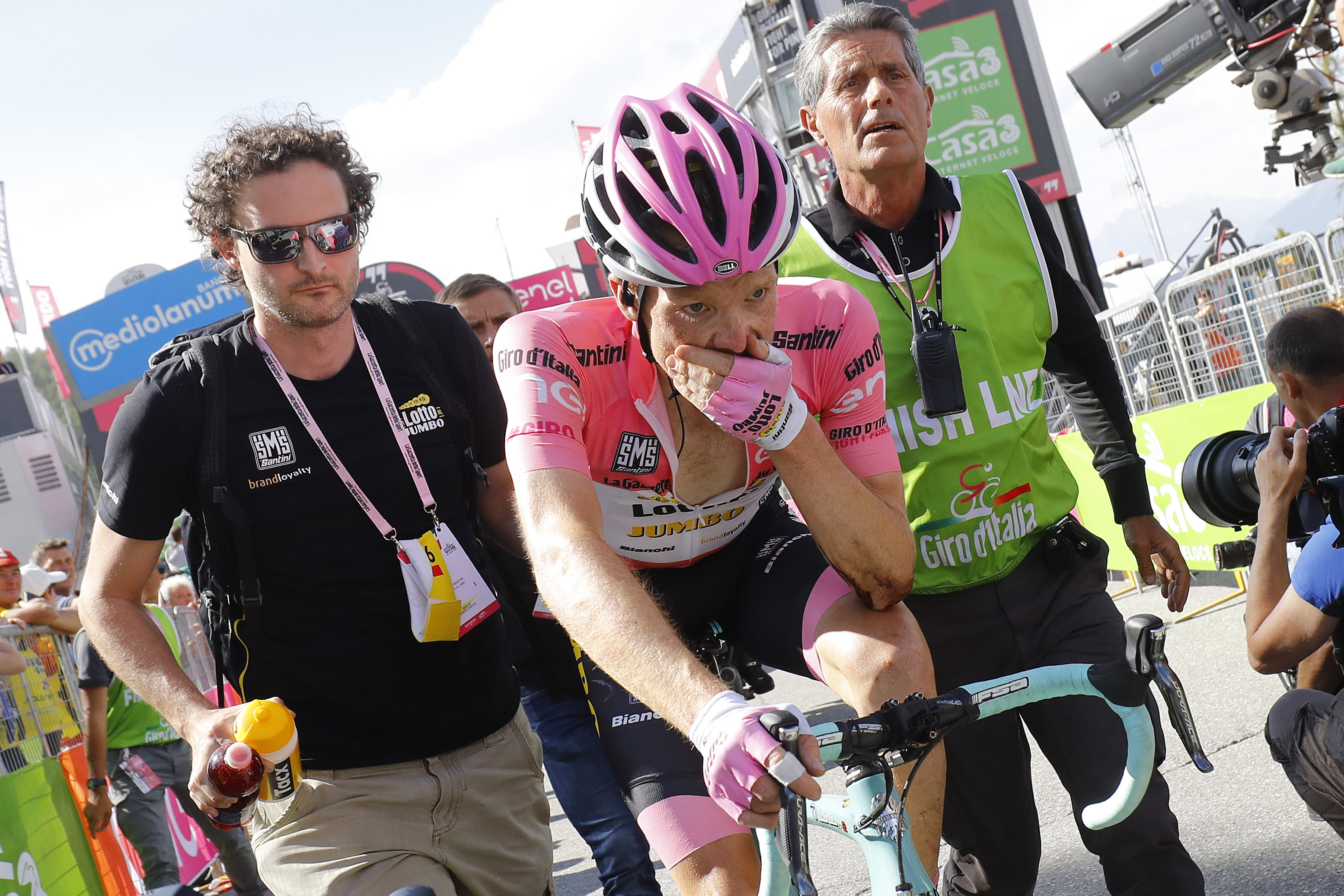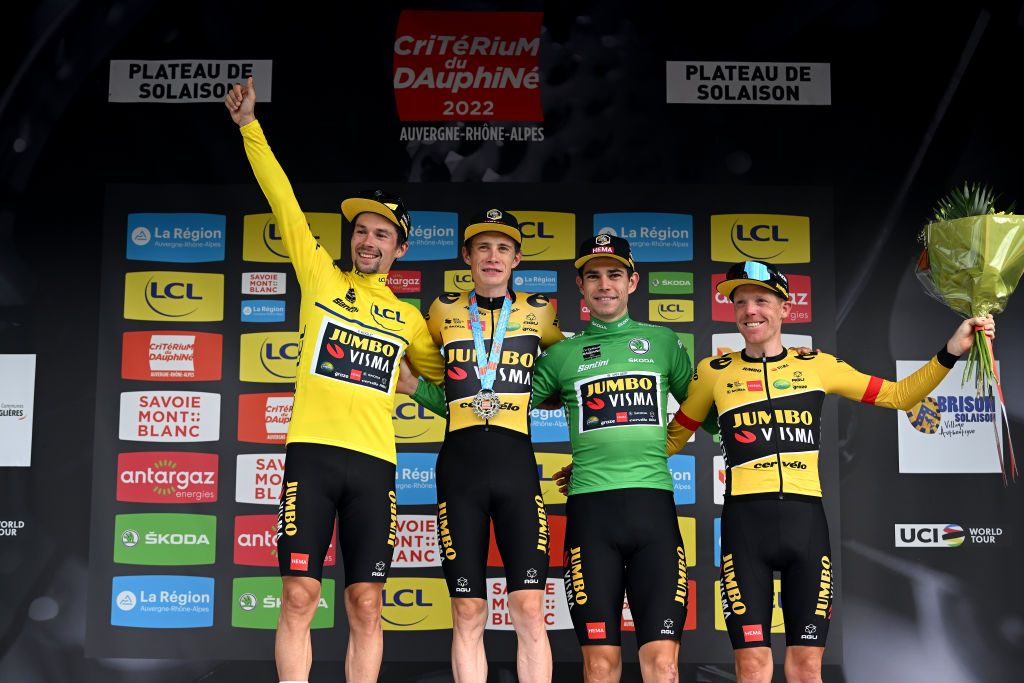
A little over eleven years ago, in a half-empty ballroom of the Playitas hotel in Fuerteventura, Jumbo-Visma’s current era of plenty would have been hard to imagine. That evening, Steven Kruijswijk was among the riders introduced by newly installed manager Richard Plugge at a decidedly low-key team presentation. Then again, the muted atmosphere was understandable.
Following Rabobank’s withdrawal at the end of the 2012 season in response to years of doping transgressions, the team had rebranded as Blanco while they sought a replacement backer. Just as T-Mobile had done when they left the sport five years earlier, Rabobank provided parachute payments that would allow Blanco to compete in 2013, but in that gloomy winter, bookended by the USADA Reasoned Decision and Lance Armstrong’s belated doping confession, their long-term prospects looked bleak.
The smattering of journalists in the room was limited to a solid cohort from the Dutch-speaking press, a pair of local reporters and Cyclingnews. Quite reasonably, they were focused more on the demise of Rabobank than the flickering prospect that Blanco might survive or even thrive among the ruins.
The evening was Plugge’s first on the job following his promotion from press officer to team manager, formally announced that very morning, and it was also sports director Merijn Zeeman’s first public appearance since moving from Argos-Shimano that winter to help steer the team’s reboot.
Both men would prove key figures in the squad’s rise over the following decade – and so too would Kruijswijk, though he admitted that he could never have imagined the success that would follow, culminating in 2023’s unprecedented sweep of the Grand Tours.
“To be honest, no, at least not at this level,” Kruijswijk told Cyclingnews recently. “Still, I always had confidence in the team, because it would have been easy for me to leave the team at one point, especially when I did a good Giro and Vuelta. But I was confident that we were still in the process of growing to be one of the better teams and it turned out to be like that. I’m happy I always committed to this team, but what we are doing now is above and beyond expectations, I think.”
Kruijswijk has been with the team throughout its transition from Blanco to Jumbo-Visma, by way of Belkin and LottoNL, a distinction shared with Robert Gesink, who retires at the end of next season, and Jos van Emden, who hung up his wheels at the end of the 2023 campaign. A fourth rider, Wilco Kelderman, was part of that 2013 Blanco roster before later moving on, but he returned to the team last season, just in time to play a supporting role in the historic sweep of the Grand Tours.
Although Plugge succeeded in attracting sponsors to keep the project afloat beyond 2012, the team struggled to make an impact and occasionally shot themselves in the foot even when they did. Take, for instance, the disastrous decision to place Bauke Mollema aboard a new time trial bike on the penultimate day of the 2014 Tour de France, which saw him drop from 7th to 10th after placing 140th on the stage. Small wonder, perhaps, that Mollema left for Trek that winter.
In hindsight, the turning point in the team’s history came on the 2016 Giro d’Italia, when Kruijswijk surprisingly moved into the pink jersey after the Dolomite tappone to Corvara on the penultimate weekend and then extended his overall lead to three minutes in the third week. He was on the cusp of winning the Netherlands’ first Grand Tour in 36 years only for the race to turn on his unfortunate crash on the descent of the Colle d’Agnello with two days remaining, after pressure from eventual winner Vincenzo Nibali.
Kruijswijk would reach the finish in Turin a frustrated fourth overall, mindful that a stronger supporting cast might have limited the impact of the Agnello crash, but the moment seemed to heighten the ambition of the team.
“I hope so, I believe so,” Kruijswijk said. “I think at that point we realised that we were able to do things, but also that we had to improve on certain points. Of course, back then we were for sure not the team we are now. Sometimes I think that if I’d had the team we have now back then, then it would have been a lot easier to do some races. But I’m happy I’ve been part of this. I believe I helped this team to grow and that’s given me a lot of satisfaction.”

Enter Roglič
Kruijswijk’s near miss at the 2016 Giro coincided with the arrival of Primož Roglič at the team. At that juncture, he was still viewed merely as a ski jumping curio, and the Slovenian’s victory in the Chianti time trial on that year’s race was greeted with altogether more suspicion than praise amid reports of a late bike change before he took the start ramp.
In the years that followed, however, Roglič inexorably became the focal point of the team’s stage racing ambitions, even if Kruijswijk remained in a leadership role at first, placing fifth at the 2018 Tour and then returning to claim the third step of the podium twelve months later.
The arrival of Tom Dumoulin in 2020 and the subsequent, surprising emergence of Jonas Vingegaard a year later would see Kruijswijk gradually nudged down the hierarchy and into a supporting role, but he never seriously considered moving elsewhere in search of greater freedom.
That decision, he conceded, was helped by his career-crowning Tour podium of 2019, but it was also informed by loyalty to the team where he has raced his entire professional career. Indeed, Kruijswijk had previously spent three years at the Rabobank development squad before graduating to the pro ranks in 2010.
“I think I knew when to take my chances and I also knew what it meant for me when guys like Primož and Jonas got better and better,” he said. “It meant I’d have more of a supporting role, but I think I was fine with that – especially after getting the podium at the Tour de France, because that was really what I wanted.
“It’s not that I thought, ‘ok, now I can sit back and relax,’ but I didn’t want to change teams and so I had to accept the fact that maybe the team was outgrowing me as a leader. But I was happy with a different role, happy to still be a part of the team and help Jonas or Primož in any way.”
Circumstances, however, have restricted Kruijswijk’s chances of supporting his leaders in recent seasons. In 2020, a crash at the Critérium du Dauphiné caused him to miss the Tour, while a COVID-19 positive forced him to abandon a wide-open – and perhaps winnable – Giro that October. Illness caused him to abandon the 2021 Tour, while Kruijswijk left Vingegaard’s victorious 2022 Tour after breaking his collarbone on stage 15.
The accursed sequence continued in 2023. As ever, Kruijswijk was earmarked for Jumbo’s Tour squad from the very start of the season, but he missed the race altogether after fracturing his clavicle and pelvis at the Dauphiné. He wouldn’t recover in time for the Vuelta a España, thus missing out entirely on Jumbo-Visma’s Grand Tour sweep.
“I’m really happy for the team and what they achieved, of course, but it’s hard to miss out, especially when you do all the preparation with them,” Kruijswijk said. “But that’s the other side of the sport. Sometimes you miss out on things. But in the end, I look back on the things I achieved and not the things I didn’t achieve.”
Yet even Kruijswijk’s resolutely upbeat outlook is surely clouded by some frustration at the bad luck that has plagued him since his 2019 Tour podium. “Of course, it’s adding up in the end, I have to say,” he admitted. “But hopefully it’s the last time now. Quite a lot of things were out of my control, but it is what it is.
“Now I just want to go back in the team and put myself in the position to ride Grand Tours again and put myself in support of Jonas and the team. It’s hard sometimes, but as long as I know I’m still able to train and be mentally fit for that, then I’ll keep on going.”

Changes
Kruijswijk eventually returned to action at the Tour of Britain in September, a race that essentially marked the beginning of his 2024 season. He proceeded to line out at the Tour of Luxembourg, and he volunteered for the long haul to the Tour of Guangxi as a way of shortening his winter. “Everything I do now is more an investment for next year,” he said in China.
At one point in the autumn, mind, it wasn’t entirely clear what next year would look like for Kruijswijk, as word broke of Jumbo-Visma’s attempted – and ultimately abortive – takeover of Soudal-QuickStep. The Dutchman’s veteran status didn’t come with any additional, insider forewarning. He was as blindsided by the news as the rest of his teammates, even if he was always sanguine about what it might mean.
“I thought it was going to be hard to manage everything, with the riders, the staff and the sponsors, just from a legal standpoint with the contracts,” he said. “But I was never in doubt that the team would pick the best option and I think they did have some options to choose from. The team was maybe better off just to focus on itself, so I think it worked out fine.”
Kruijswijk was equally measured on the polemics engendered by Jumbo-Visma’s private contest for the Vuelta, where Vingegaard and Roglič attacked Kuss’ red jersey, at Bejes and on the Angliru, before relenting in the final days. There was, he maintained, no tactical decision that would have pleased all observers.
“There was not one direction that would have been good for the outside,” he said. “Everybody thinks Sepp Kuss deserved it, but it’s hard. It was a luxury problem for the team, they were there with three guys and you couldn’t think that beforehand. But in the end, everybody is happy, and that’s what counts.”
Their happiness was relative, of course. Roglič won the Giro in May, but he was clearly disappointed to miss the Tour and then get hemmed in at the Vuelta to boot. Something had to give. Even though Roglič was under contract for 2024, Plugge opted to give him his freedom, and the Slovenian will ride for Bora-Hansgrohe next season.
Jumbo-Visma will be a different beast next season, but Kruijswijk has already seen profound changes at his team over the years. The beat goes on.
“For sure, we lose a lot of wins, he’s almost a guarantee for winning stages and stage races,” Kruijswijk said. “But I think everybody accepted his wish to be the sole leader at the Tour. The only thing that really changes for us is that he is now our competitor in the Tour, and we have to beat him as well. For the rest, I think we’ll try to do the same as last year and try to win it with Jonas."







